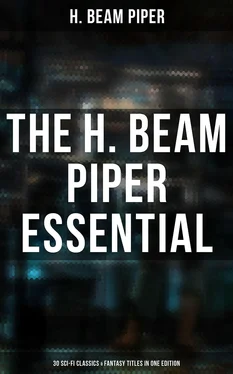Coming toward the ship out of the east, now, was a vast desert of crumbling concrete—landing fields and parade grounds, empty barracks and toppling sheds, airship docks, stripped gun emplacements and missile-launching sites. These were more recent, and dated from Poictesme's second hectic prosperity, when the Gartner Trisystem had been the advance base for the Third Fleet-Army Force, during the System States War.
It had lasted twelve years. Millions of troops were stationed on or routed through Poictesme. The mines and factories reopened for war production. The Federation spent trillions on trillions of sols, piled up mountains of supplies and equipment, left the face of the world cluttered with installations. Then, without warning, the System States Alliance collapsed, the rebellion ended, and the scourge of peace fell on Poictesme.
The Federation armies departed. They took the clothes they stood in, their personal weapons, and a few souvenirs. Everything else was abandoned. Even the most expensive equipment had been worth less than the cost of removal.
The people who had grown richest out of the War had followed, taking their riches with them. For the next forty years, those who remained had been living on leavings. On Terra, Conn had told his friends that his father was a prospector, leaving them to interpret that as one who searched, say, for uranium. Rodney Maxwell found quite a bit of uranium, but he got it by taking apart the warheads of missiles.
Now he was looking down on the granite spines of the Calder Range; ahead the misty Gordon Valley sloped and widened to the north. Twenty minutes to Litchfield, now. He still didn't know what he was going to tell the people who would be waiting for him. No; he knew that; he just didn't know how. The ship swept on, ten miles a minute, tearing through thin puffs of cloud. Ten minutes. The Big Bend was glistening redly in the sunlit haze, but Litchfield was still hidden inside its curve. Six. Four. The Countess Dorothy was losing speed and altitude. Now he could see it, first a blur and then distinctly. The Airlines Building, so thick as to look squat for all its height. The yellow block of the distilleries under their plume of steam. High Garden Terrace; the Mall.
Moment by moment, the stigmata of decay became more evident. Terraces empty or littered with rubbish; gardens untended and choked with wild growth; blank-staring windows, walls splotched with lichens. At first, he was horrified at what had happened to Litchfield in six years. Then he realized that the change had been in himself. He was seeing it with new eyes, as it really was.
The ship came in five hundred feet above the Mall, and he could see cracked pavements sprouting grass, statues askew on their pedestals, waterless fountains. At first he thought one of them was playing, but what he had taken for spray was dust blowing from the empty basin. There was a thing about dusty fountains, some poem he'd read at the University.
The fountains are dusty in the Graveyard of Dreams; The hinges are rusty, they swing with tiny screams.
Was Poictesme a Graveyard of Dreams? No; Junkyard of Empire. The Terran Federation had impoverished a hundred planets, devastated a score, actually depopulated at least three, to keep the System States Alliance from seceding. It hadn't been a victory. It had only been a lesser defeat.
There was a crowd, almost a mob, on the dock; nearly everybody in topside Litchfield. He spotted old Colonel Zareff, with his white hair and plum-brown skin, and Tom Brangwyn, the town marshal, red-faced and bulking above everybody else. Kurt Fawzi, the mayor, well to the front. Then he saw his father and mother, and his sister Flora, and waved to them. They waved back, and then everybody was waving. The gangway-port opened, and the Academy band struck up, enthusiastically if inexpertly, as he descended to the dock.
His father was wearing a black suit with a long coat, cut to the same pattern as the one he had worn six years ago. Blackout curtain cloth. It was fairly new, but the coat had begun to acquire a permanent wrinkle across the right hip, over the pistol butt. His mother's dress was new, and so was Flora's, made for the occasion. He couldn't be sure just which of the Federation Armed Forces had provided the material, but his father's shirt was Med Service sterilon.
Ashamed to be noticing things like that, he clasped his father's hand, kissed his mother, embraced his sister. There were a few, but very few, gray threads in his father's mustache; a few more squint-wrinkles around the eyes. His mother's hair was all gray, now, and she was heavier. She seemed shorter, but that would be because he'd grown a few inches in the last six years. For a moment, he was surprised that Flora actually looked younger. Then he realized that to seventeen, twenty-three is practically middle age, but to twenty-three, twenty-nine is almost contemporary. He noticed the glint on her left hand and caught it to look at the ring.
"Hey! Zarathustra sunstone! Nice," he said. "Where is he, Sis?"
He'd never met her fiancé; Wade Lucas hadn't come to Litchfield to practice medicine until the year after he'd gone to Terra.
"Oh, emergency," Flora said. "Obstetrical case; that won't wait on anything. In Tramptown, of course. But he'll be at the party.... Oops, I shouldn't have said that; that's supposed to be a surprise."
"Don't worry; I'll be surprised," he promised.
Then Kurt Fawzi was pushing forward, holding out his hand. Thinner, and grayer, but just as effusive as ever.
"Welcome home, Conn. Judge, shake hands with him and tell him how glad we all are to see him back.... Now, Franz, put away the recorder; save the interview for the Chronicle till later. Ah, Professor Kellton; one pupil Litchfield Academy can be proud of!"
He shook hands with them: Judge Ledue, Franz Veltrin, old Professor Dolf Kellton. They were all happy; how much, he wondered, because he was Conn Maxwell, Rodney Maxwell's son, home from Terra, and how much because of what they hoped he'd tell them. Kurt Fawzi, edging him aside, was the first to speak of it.
"Conn, what did you find out?" he whispered. "Do you know where it is?"
He stammered, then saw Tom Brangwyn and Colonel Klem Zareff approaching, the older man tottering on a silver-headed cane and the younger keeping pace with him. Neither of them had been born on Poictesme. Tom Brangwyn had always been reticent about where he came from, but Hathor was a good guess. There had been political trouble on Hathor twenty years ago; the losers had had to get off-planet in a hurry to dodge firing squads. Klem Zareff never was reticent about his past. He came from Ashmodai, one of the System States planets, and he had commanded a regiment, and finally a division that had been blasted down to less than regimental strength, in the Alliance Army. He always wore a little rosette of System States black and green on his coat.
"Hello, boy," he croaked, extending a hand. "Good to see you again."
"It sure is, Conn," the town marshal agreed, then lowered his voice. "Find out anything definite?"
"We didn't have much time, Conn," Kurt Fawzi said, "but we've arranged a little celebration for you. We'll start it with a dinner at Senta's."
"You couldn't have done anything I'd have liked better, Mr. Fawzi. I'd have to have a meal at Senta's before I'd really feel at home."
"Well, it'll be a couple of hours. Suppose we all go up to my office, in the meantime. Give the ladies a chance to fix up for the party, and have a little drink and a talk together."
"You want to do that, Conn?" his father asked. There was an odd undernote of anxiety, or reluctance, in his voice.
"Yes, of course. I'd like that."
His father turned to speak to his mother and Flora. Kurt Fawzi was speaking to his wife, interrupting himself to shout instructions to some laborers who were bringing up a contragravity skid. Conn turned to Colonel Zareff.
Читать дальше












